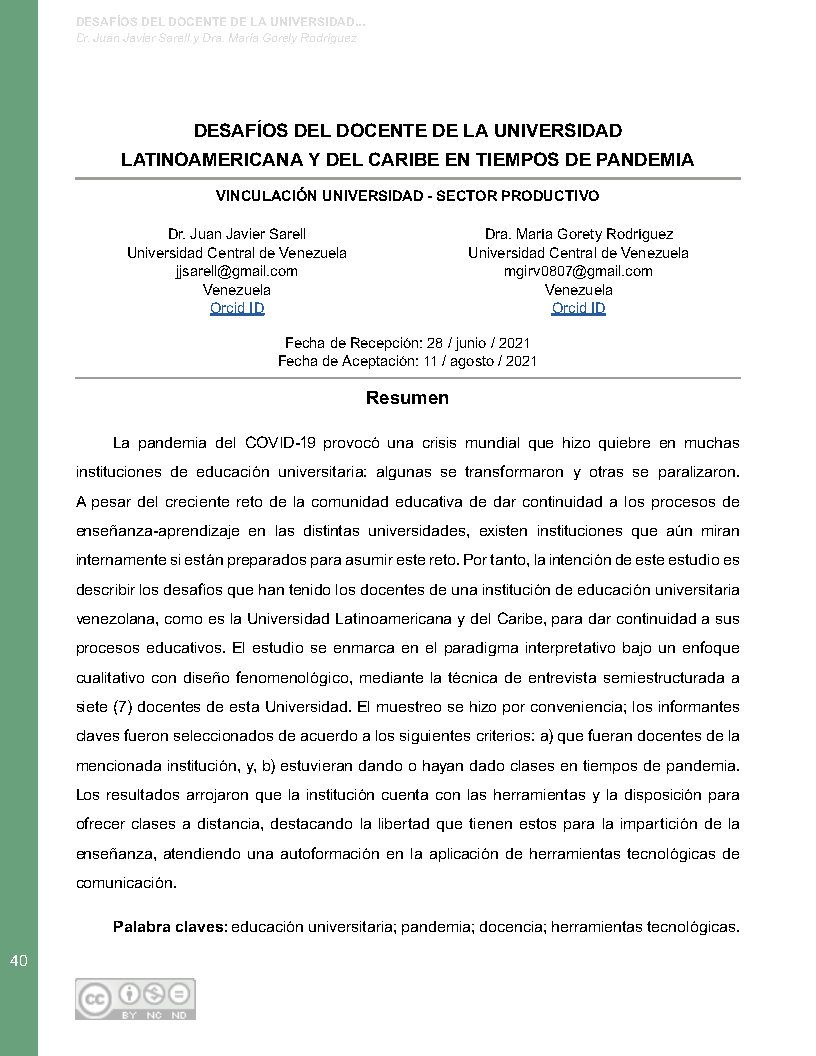Challenges for the teachers of the Latin American and Caribbean University in times of pandemic
Keywords:
higher education, pandemic, teaching, technological toolsAbstract
The COVID-19 pandemic caused a global crisis that disrupted the activities of many higher education institutions: some were transformed, and others were paralyzed. Despite the growing challenge of the educational community to give continuity to the teaching-learning processes in the different universities, some institutions are still looking internally to determine if they are prepared to take on this challenge. Therefore, this study intends to describe the challenges that the teachers of a Venezuelan higher education institution, such as the Latin American and Caribbean University, have had to continue with their educational processes. The study is framed within the interpretive paradigm, under the category of a qualitative approach with a phenomenological design, using the semi-structured interview technique given to seven (7) teachers of this University. Sampling was based on convenience; the key informants were selected according to the following criteria: a) that they were teachers of the aforementioned institution, and b) they were teaching or have taught in times of the pandemic. The results showed that the institution has the tools and the willingness to offer distance classes, highlighting the freedom they have for teaching, attending to self-training in the application of technological communication tools.
Downloads
References
Aker, S. R. (1985). The teleconference triability laboratory: fostering the diffusion process through organizational learning. En Lome A. Parker y Christine H. Olgren Comp.), Teleconferencing and electronic communications: Applications technology and human factors (pp. 210-215). Madison: Center for Interactive Programs, University of Wisconsin- Extension.
Brandt, C. (2018). Andragogía: propuesta de autoeducación. Caracas: Tercer Milenium C.A.
Cáceres-Piñaloza K.F. (2000). Educación virtual: Creando espacios afectivos, de convivencia y aprendizaje en tiempos de COVID-19. CienciAmérica, 9 (2), 38-44. http://cienciamerica.uti.edu.ec/openjournal/index.php/uti/article/view/284
Castellano Gil, J. M., Almagro Lominchar, J., y Fajardo Pucha, Ángel B. (2021). Percepción estudiantil sobre la educación online en tiempos de COVID-19: Universidad de Almería (España). Revista Scientific, 6 (19), 185–207. https://doi.org/10.29394/Scientific.issn.2542-2987.2021.6.19.9.185-207
Fuster, D. (2019). Investigación cualitativa: Método fenomenológico hermenéutico. Propósitos y Representaciones, 7(1), 201-229. http://dx.doi.org/10.20511/pyr2019.v7n1.267
García García, M. D. (2020). La docencia desde el hogar. Una alternativa necesaria en tiempos del Covid 19. Polos de Conocimiento (44) Vol. 5, No 04, abril 2020, 304-324. https://dialnet.unirioja.es/descarga/articulo/7398376.pdf
Hurtado, F. J. (2020). Educación, Sociedad e Ideología: La Trilogía Imperante del Siglo XXI. Revista Arbitrada del Centro de Investigación y Estudios Gerenciales, 42, 138-149 https://www.grupocieg.org/archivos_revista/Ed.42(138-149)%20Frank%20Junior%20Hurtado%20Talavera_articulo_id602.pdf
Johnson, N., Veletsianos, G., y Seaman, J. (2020). U.S. Faculty and Administrators’ Experiences and Approaches in the Early Weeks of the COVID-19 Pandemic. Online Learning, 24 (2). https://doi.org/10.24059/olj.v24i2.2285
Kemelmajer, C. (2020). Educación en tiempos de pandemia: consejos de especialistas para enriquecer las aulas virtuales. https://www.conicet.gov.ar/educacion-entiempos-de-pandemia-consejos-de-especialistas-para-enriquecer-las-aulas-virtuales/
Marín Díaz, J. (2018). Desarrollo académico del personal docente y de investigación de la Universidad Central de Venezuela en tiempos de crisis. Período 2007-2015. Areté. Revista Digital del Doctorado en Educación de la Universidad Central de Venezuela. 4 (7), 123–146.
Muñoz, D. J. (2020) Educación Virtual en pandemia: una Perspectiva desde la Venezuela Actual. Revista EDUCARE - UPEL-IPB - Segunda Nueva Etapa 2.0, 24(3), 387–404. https://doi.org/10.46498/reduipb.v24i3.1377
Organización de las Naciones Unidas para la Educación, la Ciencia y la Cultura (UNESCO). 18/03/2020. Diez recomendaciones para estudiar a distancia durante la emergencia del coronavirus. https://news.un.org/es/story/2020/03/1471342
Organización Mundial de la Salud (OMS). 11/03/2020. Alocución de apertura del Director General de la OMS en la rueda de prensa sobre la COVID-19. https://www.who.int/es/dg/speeches/detail/who-director-general-s-opening-remarks-at-the-media-briefing-on-covid-19---11-march-2020
Organización para la Cooperación y Desarrollo Económico (OCDE). 30/03/2020. A framework to guide an education response to the COVID-19 Pandemic of 2020. https://www.hm.ee/sites/default/files/framework_guide_v1_002_harward.pdf
Picón, G. A., González de Caballero, G. K. y Paredes Sánchez, J. N. (2020). Desempeño y formación docente en competencias digitales en clases no presenciales durante la pandemia COVID-19. https://preprints.scielo.org/index.php/scielo/preprint/download/778/1075/111
Ríos, M. J. y Rodríguez, M. G. (2010). Transversalidad en entornos virtuales de aprendizaje: una experiencia en los Estudios Universitarios Supervisados de la Universidad Central de Venezuela. https://n9.cl/k76hw
Rodríguez, M. (2020). De la gestión educativa presencial a un cambio organizacional como consecuencia del covid.19. [Webinar]. https://n9.cl/jzv09
Rodríguez, M. G. (2020). Intersubjetividad dialógica en el acompañamiento pedagógico del docente instructor universitario. Areté. Revista Digital del Doctorado en Educación de la Universidad Central de Venezuela. 6 (11), 217 – 237.
Santillán, W. (2020). El teletrabajo en el Covid-19. CienciAmérica, 9 (2), 65-76.
Sarell, J. J. (2018). Competencias dinamizadoras: una propuesta para la gestión de conocimiento en la era de transformación digital. Gestión I+D. Revista del Postgrado en Gestión en Investigación y Desarrollo. 3 (2). 9-35.
Van Manen, M. (1999). The practice of practice. En: Lange, M.; Olson, J., Hansen, H. y Bÿnder, W. (Eds.). Changing Schools/Changing practices: Perspectives on educational reform and teacher professionalism. Lovaina: Garant



